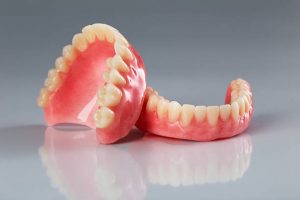 Every tooth is important for a healthy functional smile. Unfortunately, 40 million Americans don’t have any teeth left. Dentures are the go-to solution to replace lost teeth. Although they are effective, they can affect your nutrition if they don’t fit well. Here is what you need to know to ensure you’re getting enough nutrients.
Every tooth is important for a healthy functional smile. Unfortunately, 40 million Americans don’t have any teeth left. Dentures are the go-to solution to replace lost teeth. Although they are effective, they can affect your nutrition if they don’t fit well. Here is what you need to know to ensure you’re getting enough nutrients.
Nutritional Complications of Poor-Fitting Dentures
Traditional full dentures replace an entire arch of lost teeth. Prosthetic teeth are set in a gum-colored base that rests on top of your gums using suction to stay in place. This allows you to enjoy a variety of foods, but dentures have their limitations.
It’s not unusual for them to slip over time because your mouth changes shape from bone loss. You can lose 25% of your jaw’s density within the first year of missing a tooth because it isn’t being stimulated by the root. As more time passes, your jaw will continue to shrink, even after you’ve lost all of your teeth.
Your dentures will not adjust to the changes which can cause slipping and irritation. If your dentures don’t fit well, eating certain foods can be difficult or painful. As a result, you may eliminate them from your diet, which can lead to nutritional deficiencies that harm your health.
How to Stop Poor-Fitting Dentures
Poor nutrition isn’t the only concern about slipping dentures. Researchers have also found a connection to certain cancers, infections, and other health issues. You can ensure a snug fit by:
- Regular Relining: Although you may not have any teeth left, you still need to visit your dentist every 6 months for a checkup. Not only will they keep your mouth healthy, but they’ll also adjust your dentures regularly to promote their comfort and lifespan.
- Adhesive: A denture adhesive can give you extra stability when you need it, like when enjoying a steak. However, it is not something you want to rely on daily.
- Replacements: Dentures last for about 5 to 7 years before needing to be replaced. If your dentures are older, it may be time for a new set.
Invest in Unmatched Stability
You can stop slipping and irritation for good by investing in dental implants. 4 to 10 implant posts are surgically placed into your jaw to serve as new tooth roots. They will anchor your dentures to your jaw to benefit from the next best thing to your real teeth. They’ll restore 70% of your natural biting force, so you can eat just about anything.
With over a 95% success rate and a lifespan of 30 years or more, you will invest in a long-lasting solution to keep your mouth and body healthy.
About Dr. Anthony J. Benza
Dr. Benza achieved degrees in biology and biomedical science before earning his dental degree at Case Western Reserve University Dental School. He regularly continues his education to provide many specialty services, including dental implants. Dr. Benza is a member of several professional organizations, including the American Dental Association. Request an appointment through his website or call (239) 399-5358.
